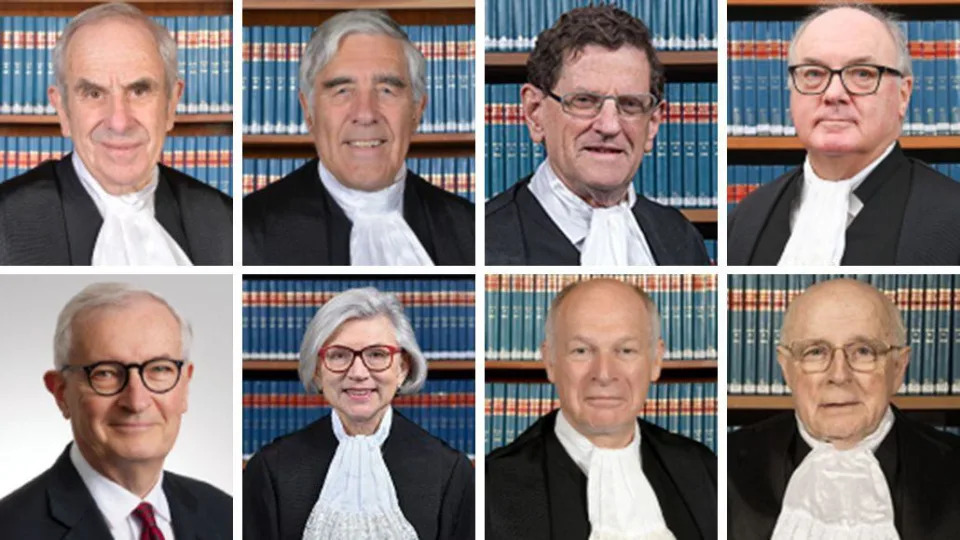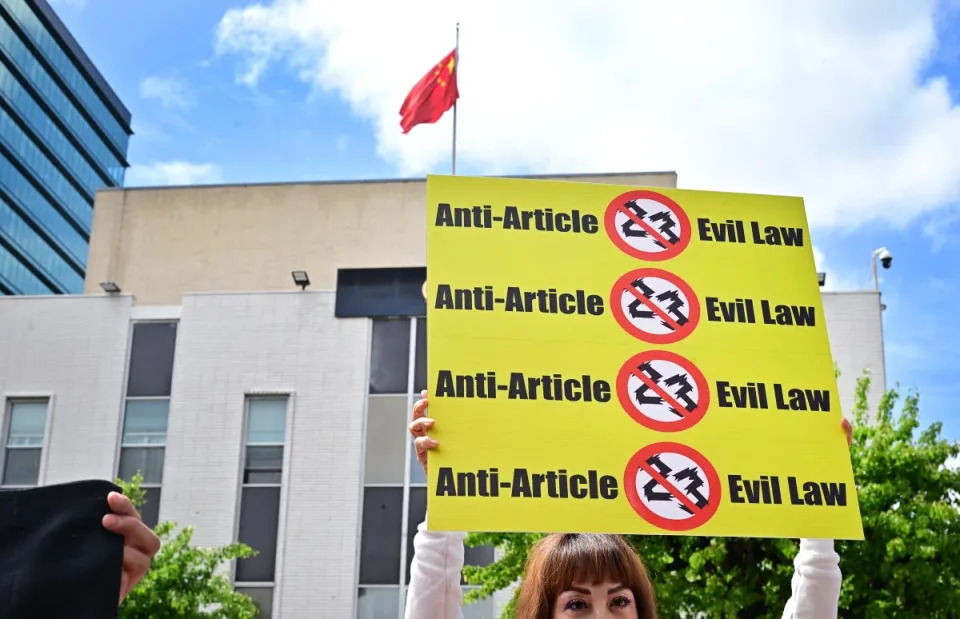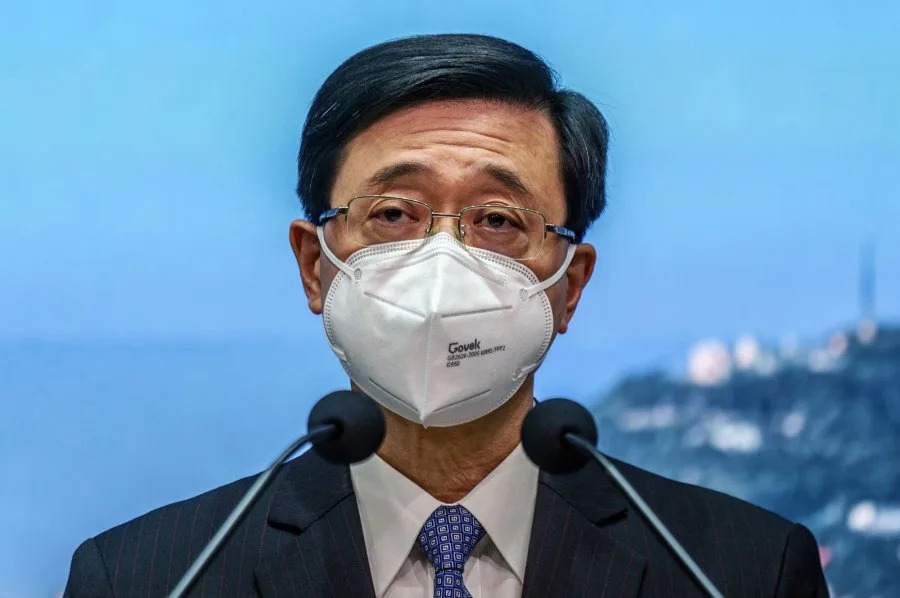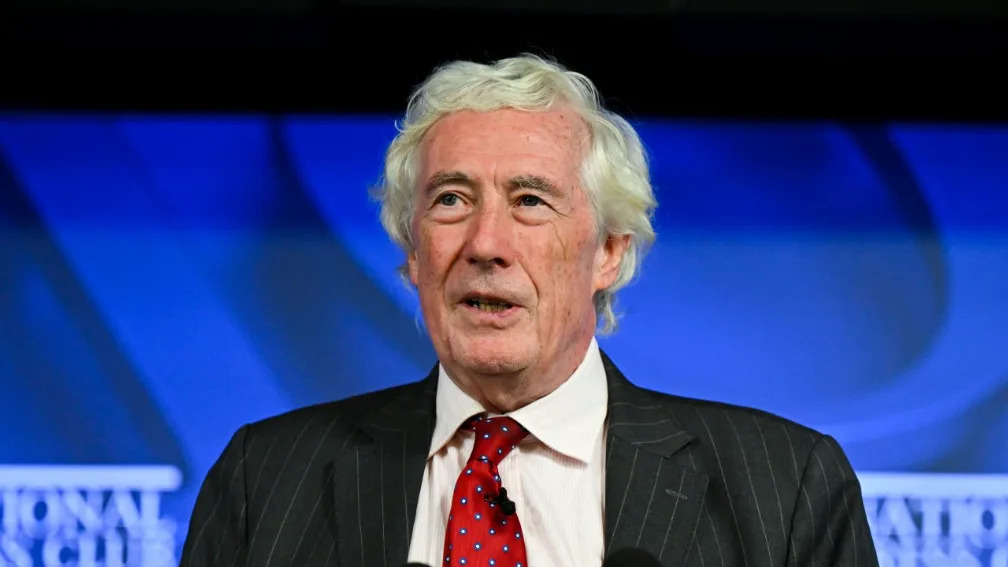Hong Kong says Britain 'weaponizing' judiciary after judge quits, citing China interference

Hong Kong Chief Executive John Lee Ka-chiu accused Britain of weaponizing its judicial influence after a senior British judge resigned from its highest court saying the independence of the courts was being undermined by pressure from China.
Hong Kong's chief executive, John Lee, hit back Tuesday at a senior appeal court judge who quit due to "the oppressive situation created by China," adding that the territory was sliding into totalitarianism.
Accusing Court of Final Appeal judge Lord Jonathan Sumption, who resigned Thursday along with fellow British judge Lord Lawrence Collins, of being politically motivated and arguing he should stick to the law and stay out of politics, Lee told a news briefing that Britain was "weaponizing its judicial influence to target China and Hong Kong."
The judges' departures followed the conviction of 14 pro-democracy activists on conspiracy to commit subversion charges under a draconian national security law imposed by Beijing in 2020, which Sumption said was the final stroke.
The defendants, former lawmakers among them, face a minimum sentence of 10 years in prison and a maximum of life.
"I think that the picture is getting darker. The judgment against the 14 democracy activists was a major indication of the lengths to which some judges are prepared to go to ensure that Beijing's campaign against those who have supported democracy succeeds," Sumption told BBC Radio.
"I have reached the point eventually where I don't think that my continuing presence on the court is serving any useful purpose."
Collins said he had resigned after 13 years "because of the political situation in Hong Kong" but stressed that he continued to have "the fullest confidence in the court and the total independence of its members."
Four other British judges continue to hold non-permanent senior judicial posts in Hong Kong.
Lee said there was absolutely no truth to the claim that the Hong Kong Special Administrative Region courts are under any political pressure from the Beijing or the HKSAR governments in the adjudication of national security cases or indeed any case of any nature; or that there is any decline in the rule of law in Hong Kong.
AfriPrime App link: FREE to download...
https://www.amazon.com/Africircle-AfriPrime/dp/B0D2M3F2JT
Insisting that the independence of the judiciary was guaranteed by Hong Kong's mini-constitution, Lee said judges' "professional expertise is on law, based on his legal knowledge and experience, not on politics."
"A judge is entitled to his personal political preferences," Lee said. "A judge can like a particular system or dislike it. He may also like a particular law or not, but his professional duty is to interpret and apply that particular piece of law in accordance with legal principles and evidence, whether he likes that law or not; not from his political stance."
Lee pointed to the fact Lord Sumption had previously defended the independence of the judicial system.
"His latest statement indicates that he does not like the political situation in Hong Kong. But this is exactly the area he has told us in 2021 that should not be confused with the rule of law," he said.
"His recent statement looks to me to be contradictory to his previous stance in this regard. Indeed, people who try to damage the rule of law in Hong Kong, are among those in the U.K, in the U.K. Government, the U.K. politicians and some anti-China, anti-Hong Kong media.
"They openly threatened to impose sanctions on judges before, during and after the trials. These are blatant attempts to attack the rule of law in Hong Kong."
Lee said the HKSAR Government "will not, interfere or attempt to interfere, with judges' conduct of trials. We have not done it and we will not do it. Non-interference of the judicial process is the DNA of Hong Kong's rule of law."
AfriPrime App link: FREE to download...
https://www.amazon.com/Africircle-AfriPrime/dp/B0D2M3F2JT
'Becoming a totalitarian state': UK judge on why he quit Hong Kong court
Lord Sumption (pictured) is one of the three foreign judges who have resigned from the Court of Final Appeal.
A high-profile British judge who resigned from Hong Kong’s highest court last week has warned the city is “slowly becoming a totalitarian state” and judges are being compromised by an “impossible political environment created by China”.
Lord Sumption’s comments on Monday came as a third senior foreign judge in the past week resigned from the Court of Final Appeal.
"The problem in Hong Kong has been building up over the last four years and I think all the judges on the court feel concerned about this," Lord Sumption told the BBC's Today programme.
"I have reached the point eventually where I don’t think that my continuing presence on the court is serving any useful purpose."
On Monday he wrote in a newspaper op-ed that the city's rule of law has been "profoundly compromised".
Hong Kong’s government said it "strongly disapproves" of Lord Sumption's opinions, calling them a "betrayal against Hong Kong's judges".
It highlighted remarks from the other leaving judges who said they still believed in the independence of the courts.
Canadian judge Beverley McLachlin, who resigned on Monday citing her wish to spend more time with family said: "I continue to have confidence in the members of the Court, their independence, and their determination to uphold the rule of law.”
But her departure as well as that of Lords Sumption and Lawrence Collins - another former UK Supreme Court justice- last week means at least six senior foreign judges have stepped down from sitting in Hong Kong since a major national security law (NSL) was imposed by China in 2020.
Lord Sumption has been much more overtly critical than his peers- arguing that the laws, which have been widely criticised as being draconian, have overridden the independent functioning of courts and heaped pressure on the judiciary.
“Intimidated or convinced by the darkening political mood, many judges have lost sight of their traditional role as defenders of the liberty of the subject, even when the law allows it,” he wrote in the Financial Times.
AfriPrime App link: FREE to download...
https://www.amazon.com/Africircle-AfriPrime/dp/B0D2M3F2JT
An 'oppressive' situation in Hong Kong
Speaking to the BBC on Monday, Lord Sumption said it had become increasingly clear that Hong Kong’s supercharged security laws were being used to "crush peaceful political dissent, not just riots."
Legal experts have for some time now warned about the city’s degraded rule of law in the wake of laws enacted by Beijing.
China and Hong Kong have defended the NSL laws as crucial to maintaining law and order in the city after major pro-democracy protests and unrest in 2019 and 2020.
But rights groups and Western governments say the law has been used to criminalise acts of free speech and assembly, leading to a near complete silencing of dissent in the global financial hub,.
More recently, the EU and the US heavily criticised as “politically motivated” the conviction of 14 democracy activists on 30 May for “subversion” . The defendants in the landmark Hong Kong 47 case face a minimum of 10 years in prison and could even be jailed for life.
That case "was the last straw", Lord Sumption said, referencing the court's assessment that organising a political primary was tantamount to a national security crime.
"The judgement... was a major indication of the lengths to which some judges are prepared to go to ensure that Beijing's campaign against those who have supported democracy succeeds."
He also emphasised the other major problem: "If China doesn't like the court's decisions it can reverse them."
Such a precedent was set in 2023, when in the high-profile prosecution of Hong Kong billionaire Jimmy Lai, Beijing overturned the Court of Final Appeal’s ruling to allow the democracy activist his choice of lawyer.
He also spoke of further pressures on judges, describing in his op-ed an “oppressive” environment. He wrote of the government’s “continued calls for judicial ‘patriotism’” and the outrage sparked in the rare instances when a judge acquits or grants bail to an NSL defendant.
“It requires unusual courage for local judges to swim against such a strong political tide. Unlike the overseas judges, they have nowhere else to go," he wrote.
Why are there foreign judges serving in Hong Kong?
It is a holdover from Hong Kong’s past as a British colony.
After the UK handed Hong Kong back to China in 1997, the agreement between the countries stipulated that the special territory would continue to operate with its freedoms and systems for 50 years- including its common law legal system which operates in several other jurisdictions worldwide.
Currently there seven foreign judges remaining on the court– three British and four from Australia. Typically they are very experienced senior judges who have retired from their countries’ senior courts.
They operate as overseas non-permanent appointees; a typical appeal bench of five judges at the Court of Final Appeal will see a foreign judge hearing the case along with three other local judges.
Their presence was long seen as a sort of bulwark protection to help uphold the British-style common law legal system which has been key to Hong Kong’s stature as a global financial hub.
As recently as March this year, Hong Kong’s leader praised the foreign judges saying their appointments "help maintain a high degree of confidence in (Hong Kong's) judicial system". According to recent media reports, they are paid £40,000 per case.
Lord Sumption had said most of Hong Kong’s judges are “honourable people with all the liberal instincts of the common law.”
“But they have to operate in an impossible political environment created by China.”

Controversial presence
Since Hong Kong’s security laws kicked in, rights groups, critics and even the UK government had questioned the foreign judges’ continued presence on the court.
In 2020, a senior Australian judge was the first to step down from the court. James Spigelman directly cited the impact of the wide-sweeping National Security Law which hadn’t kicked into operation yet.
Two years later, UK Supreme Court justices Robert Reed and Patrick Hodge also stepped down following concerns raised by the British government.
Lord Reed, the chief justice of the top UK court, said he agreed with the government that serving Supreme Court justices could not continue to serve in Hong Kong without appearing to endorse a government that had “departed from values of political freedom, and freedom of expression”.
The remaining judges on the court at the time – which included Lords Collins and Sumption – issued a statement shortly after defending their position.
They said they believed their “continued participation” would be “in the interest of the people of Hong Kong”.
But on Monday, Lord Sumption said he no longer believed this.
He told the BBC he had chosen to stay on the first few years "to see how things develop and to hope that one can make a positive contribution." He had written he hoped "the presence of overseas judges would help sustain the rule of law."
"It's taken a long time to conclude that that is not realistic."
His sharp criticism and the resignations of the other judges will further fuel concerns about Hong Kong’s status as an international city, particular as the latest resignations come just weeks after the city implemented a second, even more wide-scoping security law known as Article 23.
Legal scholar Eric Lai, told the BBC the two British judges had been “well known” for their support of Hong Kong’s legal system in the past and their commitment to the court in critical cases.
“Their change of mind to resign signals the worsening legal environment in HK,” he said.
But the city's authorities defend the integrity of their legal system.
The chief justice of the Court of Final Appeal said last week the court would continue to function regardless of the resignations.
Andrew Cheung stressed the court's independence: "All judges and judicial officers will continue to... administer justice in full accordance with the law, without fear or favour, self-interest or deceit".
AfriPrime App link: FREE to download...
https://www.amazon.com/Africircle-AfriPrime/dp/B0D2M3F2JT
Canadian judge becomes latest to quit Hong Kong as city ‘turning into totalitarian state’
Canadian judge becomes latest to quit Hong Kong as city ‘turning into totalitarian state’
China is turning Hong Kong into a “totalitarian state” by compromising the rule of law, according to a British judge who resigned from the city’s top court last week.
Jonathan Sumption is one of two British judges who resigned shortly after a Hong Kong court convicted 14 activists of subversion under a contentious national security law enacted in the wake of mass protests five years ago.
Mr Sumption and Lawrence Collins are set to be followed by Beverly McLachlin, former chief justice of the Supreme Court of Canada, who is leaving Hong Kong's top court when her term ends in July.
“It has been a privilege serving the people of Hong Kong. I continue to have confidence in the members of the Court, their independence, and their determination to uphold the rule of law,” Ms McLachlin said in a brief statement.
In an article for the Financial Times, Mr Sumption, who served as a non-permanent overseas judge, described growing "paranoia of the authorities" and intimidation of the judges by a "darkening political mood" in the city.
"Hong Kong, once a vibrant and politically diverse community, is slowly becoming a totalitarian state,” he wrote. “The rule of law is profoundly compromised in any area about which the government feels strongly.”
He stayed on at the court hoping the presence of overseas judges would help sustain the rule of law, Mr Sumption said, but "I fear that this is no longer realistic”.
China has allowed non-permanent foreign judges to sit on Hong Kong’s Court of Final Appeal even after it took the then British colony back in 1997 to enable continuity with British Common Law tradition, provide expertise to local lawyers and reassure businesses and financial markets.
AfriPrime App link: FREE to download...
https://www.amazon.com/Africircle-AfriPrime/dp/B0D2M3F2JT

Hong Kong’s administration reacted strongly to Mr Sumption's article, saying there was "absolutely no truth that the city courts are under any political pressure".
"Anyone who suggested otherwise, no matter what the reasons or motives may be, would be utterly wrong, totally baseless, and must be righteously refuted," it said in a statement on Tuesday.
The city’s leader, John Lee, said the professional duty of judges was to interpret and apply laws in accordance with legal principles and evidence regardless of their political views.
"Some UK officials and politicians try to weaponise the UK's judicial influence to target China and Hong Kong,” he said.
"A judge is entitled to his personal political preferences, but that is not a judge's area of professional expertise.”
In 2022, another British judge, Robert Reed, stepped down from the top court saying the city’s administration had "departed from values of political freedom and freedom of expression."
Hong Kong has detained over 1,800 people in a crackdown on protests since the 2019 agitation, many of them under the national security law.
AfriPrime App link: FREE to download...
https://www.amazon.com/Africircle-AfriPrime/dp/B0D2M3F2JT
Hong Kong Rule of Law in ‘Grave Danger,’ Quitting Judge Says
A prominent UK judge who resigned from Hong Kong’s top court has warned of “grave danger” to the finance hub’s coveted legal system, in a scathing critique of China’s crackdown on dissent in the city.
Jonathan Sumption, who served as an overseas judge at the city’s Court of Final Appeal, claimed the former British colony “is slowly becoming a totalitarian state” in an opinion piece published in the Financial Times on Monday. His comments come as a wave of foreign judges quit the city’s highest court, potentially undermining confidence in one of its main attractions for global businesses.
“Hong Kong, once a vibrant and politically diverse community is slowly becoming a totalitarian state,” Sumption wrote. “The rule of law is profoundly compromised in any area about which the government feels strongly.”
Hong Kong’s leader hit back at Sumption on Tuesday, and questioned his qualification for making political comments.
“A judge can like a political system or dislike it. He may also like a particular law or not. But his professional duty is to interpret and apply that particular piece of law in accordance with legal principles and evidence,” Chief Executive John Lee said at a regular press briefing.
Previously, Lee’s government issued a detailed rebuttal to Sumption’s article, saying any suggestion that courts are pressured by Beijing would be “utterly wrong.”
AfriPrime App link: FREE to download...
https://www.amazon.com/Africircle-AfriPrime/dp/B0D2M3F2JT
Eight overseas justices have resigned or ended their terms on the city’s highest court since Beijing imposed a national security law to silence political opposition in 2020, with at least five citing political reasons. Lawrence Collins, who also quit last week, cited the city’s “political situation” after he tendered his resignation.
Beverley McLachlin, who was the Supreme Court of Canada’s longest-serving chief justice, announced Monday that she planned to retire from Hong Kong’s Court of Final Appeal when her term ends July 29. Unlike the two British judges, she did not cite political reasons for her decision.
Their exits will leave the city with the fewest foreign judges since 1999, a low that comes as Hong Kong seeks to repair a global image damaged by pandemic self-isolation and years of political unrest. Two foreign judges, both from Australia, have been appointed to the court since the China-drafted law passed.
Hong Kong has touted its appointment of prominent overseas judges to its top court as a testament to the city’s independent judiciary since returning to Chinese rule in 1997. Critics have accused foreign judges of helping Beijing silence the city’s once-vocal political opposition, despite the fact they haven’t ruled on sensitive national security cases.
McLachlin, who joined the Hong Kong court in 2018, had faced calls in Canada to step down amid criticism her presence was lending credibility to a legal system President Xi Jinping’s government is using to wipe out dissent.
In a brief statement, McLachlin said she continued to have confidence in the members of the court and their independence. The Hong Kong government thanked McLachlin for her “objective appraisal” of rule of law in the once-freewheeling Chinese territory.
Her departure in July will leave seven overseas judges on Hong Kong’s Court of Final Appeal, compared to 15 who served on the court in 2019 — the year that mass street protests swept the city opposing greater Communist Party control in the once free-wheeling hub.
The latest resignations come months after Hong Kong passed its own security law, known as Article 23, which the US, European Union and UK warned could further muzzle open discussion in the global finance hub.
The Hong Kong government said the city’s national security laws and the city’s de facto constitution, the Basic Law, protect human rights and freedoms in its Tuesday statement.
But Sumption criticized the 2020 Beijing-imposed national security law as “illiberal legislation” that severely limits judges’ freedom of action.
“There are guarantees of freedom of speech and assembly in both the Basic Law and the national security law, but only lip-service is ever paid to them. The least sign of dissent is treated as a call for revolution,” he said.
Ronny Tong, a member of the Executive Council and a former chairman of the Hong Kong Bar Association, criticized the UK government for allegedly pressuring its judges to resign from Hong Kong’s top court and questioned the need for foreign judges at all.
“The insinuation that the independence of the courts depends on the presence of one or two British judges would be quite offensive to the judges still sitting on our courts,” Tong wrote in the South China Morning Post in an article published Tuesday.
“Few other places on Earth allow foreign judges to sit on their final appeal court,” he wrote. “Should we continue this tradition, for want of a better word, forever?”
AfriPrime App link: FREE to download...
- Questions and Answers
- Opinion
- Story/Motivational/Inspiring
- Technology
- Art
- Causes
- Crafts
- Dance
- Drinks
- Film/Movie
- Fitness
- Food
- الألعاب
- Gardening
- Health
- الرئيسية
- Literature
- Music
- Networking
- أخرى
- Party
- Religion
- Shopping
- Sports
- Theater
- Wellness
- News
- Culture
- War machines and policy




